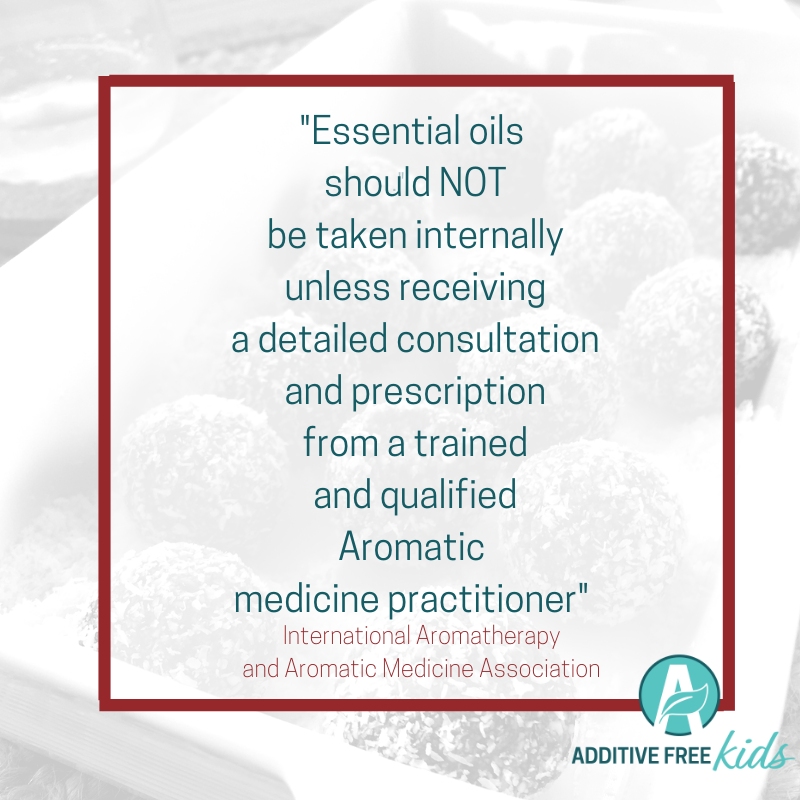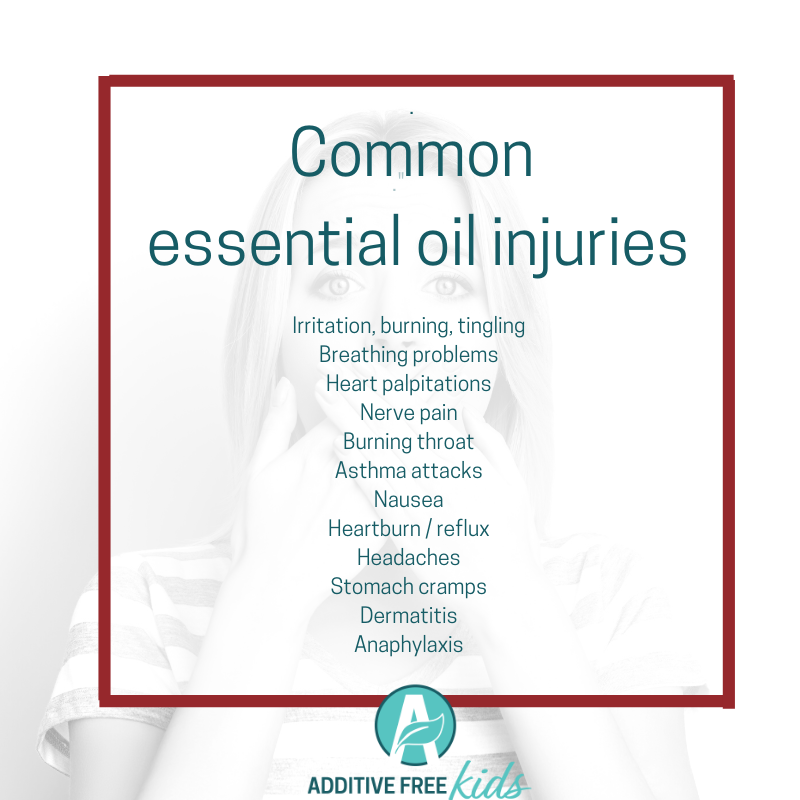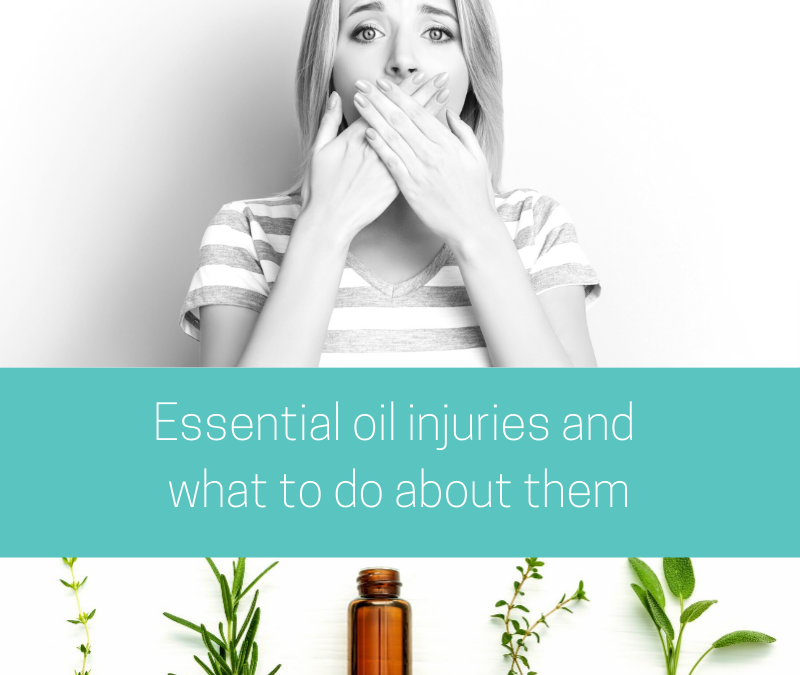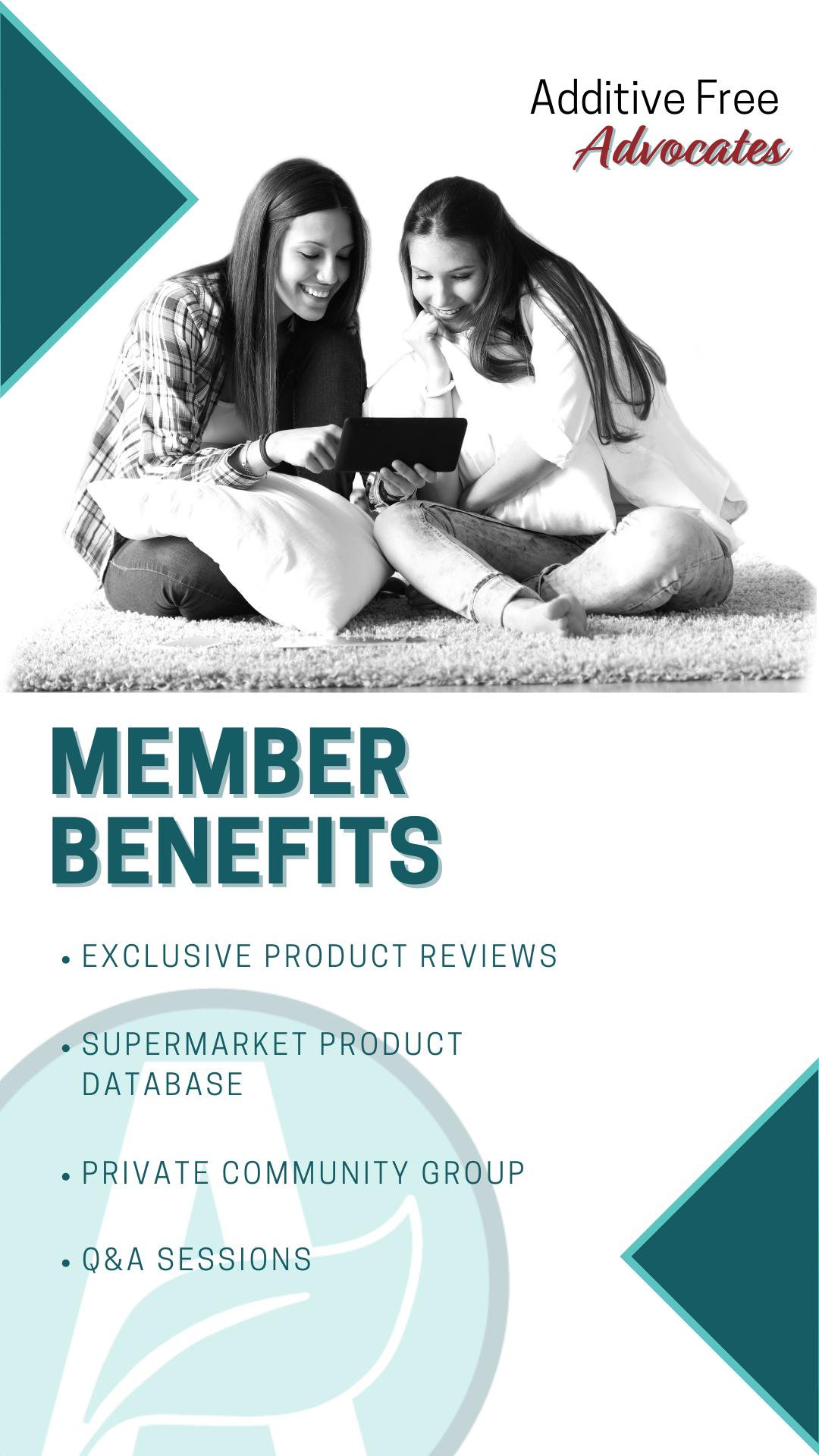This blog has been prompted by an Additive Free Kids Community member’s experience. This member reached out to me recently, as they recalled I had shared some information on essential oil safety sometime ago. The info I shared at that time was “Why you should not use essential oils for your Additive Free Kids
Our member wanted to share her experience, that these issues apply to adults too, not just kids. In her example, her injuries occurred after consuming essential oils in food, water and mouthwash.
Despite what the official company line may be, there are countless bloggers and influencers advising people it is safe to ingest these oils. Take a look on Instagram for the following hashtags and see the thousands of posts:
#essentialoilrecipes – 27,000
#essentialoilrecipe – 5,000
Our AFK Member Experience:
“I have had my own experience with this as an adult! I’ve been to an ENT many times as I’ve had severe reflux and had a camera down my throat. Now I’m heading to a gastro specialist to check out my gut. I have been prescribed medication for reflux until I can see the gastroenterologist to check out my gut microbe. I had no history of any reflux issues prior to ingesting oils (from Jan – Mar 2020). These symptoms are baffling my GP.
AFK Community Member
I tried to provide feedback to the consultants and it was ignored.
I decided to close my account and was advised that I needed to sign an ‘Intent to terminate contract’ “
I took a look at this contract and it was very interesting to see the following clause:
“I hereby waive, release and hold harmless, XXXXXXXX, its affiliated companies, officers, employees, from any claims, complaints, actions, causes of actions, liabilities, or other claims I may now or in the future have against them. I specifically waive my right to receive any further compensation from the Company and hereby rlease the Company from any claim I or others might have thereto.”
I don’t feel this is an adequate way to respond to injuries that your product may have caused. So this blog addresses what you can do instead, prior to signing the intent to terminate contract, if you have an injury.
I need to say, I am not anti essential oils.
I own them.
I believe they are a powerful medicine, and have used them in that way from the beginning. Despite recommendations from many to ingest them, I didn’t feel comfortable doing so.
I am sharing this blog, to raise awareness that if they aren’t used correctly (even though they are natural) they can still cause harm.
I spoke at length with a current council member from the International Aromatherapy and Aromatic Medicine Association (IAAMA) – Raelene Ng Binnion.
IAAMA is the leading, independent, non-profit professional association for aromatherapy practitioners in Australia and overseas. This association is actively involved in advocating for the safe and effective application of essential oils. I had a few questions that were unresolved for me that I needed clarify on (as I assume many of you do also!)
Before getting into some of my questions, I think it is worthwhile noting safety tips that are published on the IAAMA website:
IAAMA Safety Tips:
– essential oils should not be applied undiluted to skin or mucous membranes (as they are highly concentrated)
– always use essential oils in the correct dosage, if in doubt, check with qualified aromatherapist
– some oils can cause skin sensitisation or allergic reactions in some people
– some health conditions may require extra caution when using some essential oils. For example some essential oils may affect how the liver processes certain classes of medication
– less is best
– some people require lower dilutions. For example younger children, due to their skin being more permeable than adults
– some essential oils should be avoided during pregnancy
– the amount of each drop from essential oil bottles varies enormously between brands. Drops are NOT an accurate measure when diluting essential oils
and most importantly:
“Essential oils should NOT be taken internally unless receiving a detailed consultation and prescription from a trained and qualified Aromatic medicine practitioner”

Do we know the impact on our gut health?
From the research I had undertaken last year, I couldn’t find any research that supported the safe use of essential oils for kids. Raelene shared that this is a new area (similar to additives) and there isn’t enough science yet to support that essential oils are safe for our gut.
We know that these essential oils have powerful antiviral and antibacterial properties. It stands to good reason that these could be wiping out our good bacteria too! We are seeing these essential oils being used as preventative medicine for extented periods of time. There isn’t enough data to show how these essential oils impact our gut bacteria and if they irritate the gastrointestinal mucosa.
Raelene pointed out that we need to remember, if we are seeing products in pharmacies that contain essential oils, these have been measured precisely (in microdoses not drops). They are provided for medicinal use with instructions for a specific period of time (usually short term).
Should we be taking advice from essential oil reps?
Not all essential oil reps / advocates are equal. Some have undertaken additional training and would be qualified to give advice.
Raelene advised that when it comes to ingesting oils, we should seek the counsel of aromatic medicine practitioners. They are required to do 600 hours of clinical training and are trained in the ingestion of essential oils.
Prior to taking advice from your essential oil representative, ask the question, what training have they undertaken?
Is it ok to ingest essential oils? I see health food products on supermarket shelves that contain essential oils, so it must be safe?!
This is a question that I have had trouble reconciling in my own head since my last blog.
Raelene shared with me that when essential oils are used in commercial production, they are usually rectified (modified) to make them safe for consumption. In addition, they are usually measured by parts per million, not by drops. It is a very precise measurement to ensure safety.
The size of essential oil dosage is not controlled in a domestic setting. They are easy to pour and easily doubled / tripled by accident. Depending on who your distributor – you also need to be aware that the flow size of each drop is different, they aren’t standardised. My corporate brain sees that makes sense from a business model. Bigger flow, more drops are used, more bottles are used, profits increase. I feel a lot clearer on this issue now.
Essential oils shouldn’t be ingested, or used in our food in a domestic setting. Unless you have been prescribed by an aromatic medicine practitioner.
My essential oil company have told me it is ‘therapeutic grade” they are “pure”
It is interesting to note that on the IAAMA website it states that terms such as ‘therapeutic grade’ and ‘medical grade’ are “commonly used for marketing purposes and are not related in anyway to any Australian Therapeutic Goods Association standards”
These claims of purity are self determined.
You can test this for yourself. If you want to check how pure the oils are – request the GC/MS report for the essential oil you are interested in. The GC/MS report is a Gas Chromatography Mass Spectrometry report. This method is used to test oils and determine exactly what they are made of. It shows all the chemical components that make up the oil and indicate the purity of the oil.
You may be told that this is proprietary information. A red warning bell in my books! I hear this ALL THE TIME from manufacturers that think their products are clean, yet don’t want to substantiate their claims. The manufacturers that do the right thing, will happily share all information with you.
If your essential oil provider is not transparent, I recommend finding another that is. You know that I always recommend to vote with your dollar. Support the manufacturers and suppliers that have your health as their number one priority before profits.
What are common essential oil injuries?
Raelene pointed me to two resources where I could find more information on essential oil injuries:
– The Atlantic Institute issues injury reports – you can find them here.
– The Tisserand Institute also has an adverse reaction database that you can find here
To save you some time, I had a quick look for you and some common injuries / symptoms include:
– Irritation, soreness, redness, skin tingling, burning
– violently ill
– hard to breathe
– faster heart rate, heart palpitations
– nerve pain all over body
– burning throat
– asthma attacks
– nausea
– heartburn
– headaches
– stomach cramps, diarrhoea
– allergic contact dermatitis
– anaphylaxis
If you are experiencing any of these symptoms and using essential oils, you may want to investigate further.

Why don’t people report these injuries?
Discussing these issues with Raelene from IAAMA, it became very clear that often these injuries are not reported. The most common reasons why people do not report their symptoms:
1) People don’t know who to report these injuries to
2) Self blame – people blaming themselves for not doing more research, trusting instincts
3) They were told it was a detoxing reaction
4) They didn’t know it was an adverse reaction
5) It was reported to the company but they didn’t get a resolution
6) They didn’t want to risk social isolation or other negative social repercussions from voicing a complaint
Please, take a stand for your health. Listen to your body. Trust your instincts. Know that you aren’t alone. Report your symptoms and injuries (see below).
Where can you report your injuries?
Once your symptoms have been treated by an appropriate medical professional
– Tell your medical practitioner or alternative practitioners of your essential oil use
– Tell the person that you purchased the oils from of your symptoms (in writing)
– Advise the headquarters of the company that sold the essential oils of your symptoms (in writing)
– Report your essential oil injury (anonymously) with one of the two following organisations:
Atlantic Institute – https://atlanticinstitute.com/injury-reporting/
Tisserand institute –
https://tisserandinstitute.org/safety/adverse-reaction-database/#home/add-adverse-reaction-report/
Your anonymous report could help someone else that is also experiencing symptoms.
I hope that this information is useful and if it helps just one other Additive Free Kids Community member, then it has served its purpose!
If you have experienced injuries, and would like to share with the community (anonymously) feel free to email me on fr******@ad**************.au and I will attach them below for you.

If you would like to be kept up to date with the latest news, product reviews, new products joining the Additive Free Marketplace and giveaways come and join us in the Additive Free Kids Community group.
There are over 5,700 beautiful community members that are ready to support you on this amazing additive free journey.

Frankie Bell is the Managing Director of Additive Free Kids, a food coach, mentor and is one of Australia’s leading activists against additives in foods.
Frankie is a mum to 5 boys and has personal experience working through the damaging effects of additives to resolve the multiple health issues and behavioural problems in her own children. It became Frankie’s purpose to help other families achieve the same improvements for their families.
These changes can be overwhelming, especially for time poor parents, Frankie has done all the hard work for families to ensure they have access to additive free food, anytime, anywhere. Additive Free Kids specialises in assisting families to live healthy lives free from additives. See how you can work together with Frankie here.
Updates re adverse reactions from AFK Community since publishing post
“In 2011, I was at a baby expo, heavily pregnant and looking for a hand sanitiser for the nappy bag. A particular stall offered me a free sample. Within minutes my hands started to tingle. I kept browsing the stalls thinking nothing of it. Ten minutes later I was in the bathroom my hands under the cold tap trying to cool them down they were itching and burning. After I had stopped the sting I went back to the stall asking for the ingredients. They asked why. I explained that I had an allergic reaction to something but I didn’t know what. The response was “you can’t be allergic to it, its all natural” I walked away and have been extremely cautious ever since. “
“I was using peppermint beadlets in place of chewing gum. Over a few months I noticed that I was having moments where I felt like I couldn’t take a deep breath. Eventually I figured out that the one consistent thing every time I struggled to breath was that I had had a peppermint beadlet. I went to the chiropractor after I figured that out and afterwards she put a deep heat type cream on my back, by the time I went to pay I felt like I couldn’t breathe properly. I checked the bottle, peppermint oil was present. The next two days I couldn’t get a deep breath. After seeing a doctor I went back to my chiropractor and she had a feel around and suggested that after the reaction to the oil it may have pushed something out and that was putting pressure on my lung. She re-adjusted me and I was fine after that. I haven’t touched peppermint oil since.”


 My passion and mission is to work with families to reduce the overwhelm when going additive free. Moving to additive free living can bring back peace, calm and joy to families. I know it's possible and I've experienced it first hand with my 5 boys.
My passion and mission is to work with families to reduce the overwhelm when going additive free. Moving to additive free living can bring back peace, calm and joy to families. I know it's possible and I've experienced it first hand with my 5 boys.



